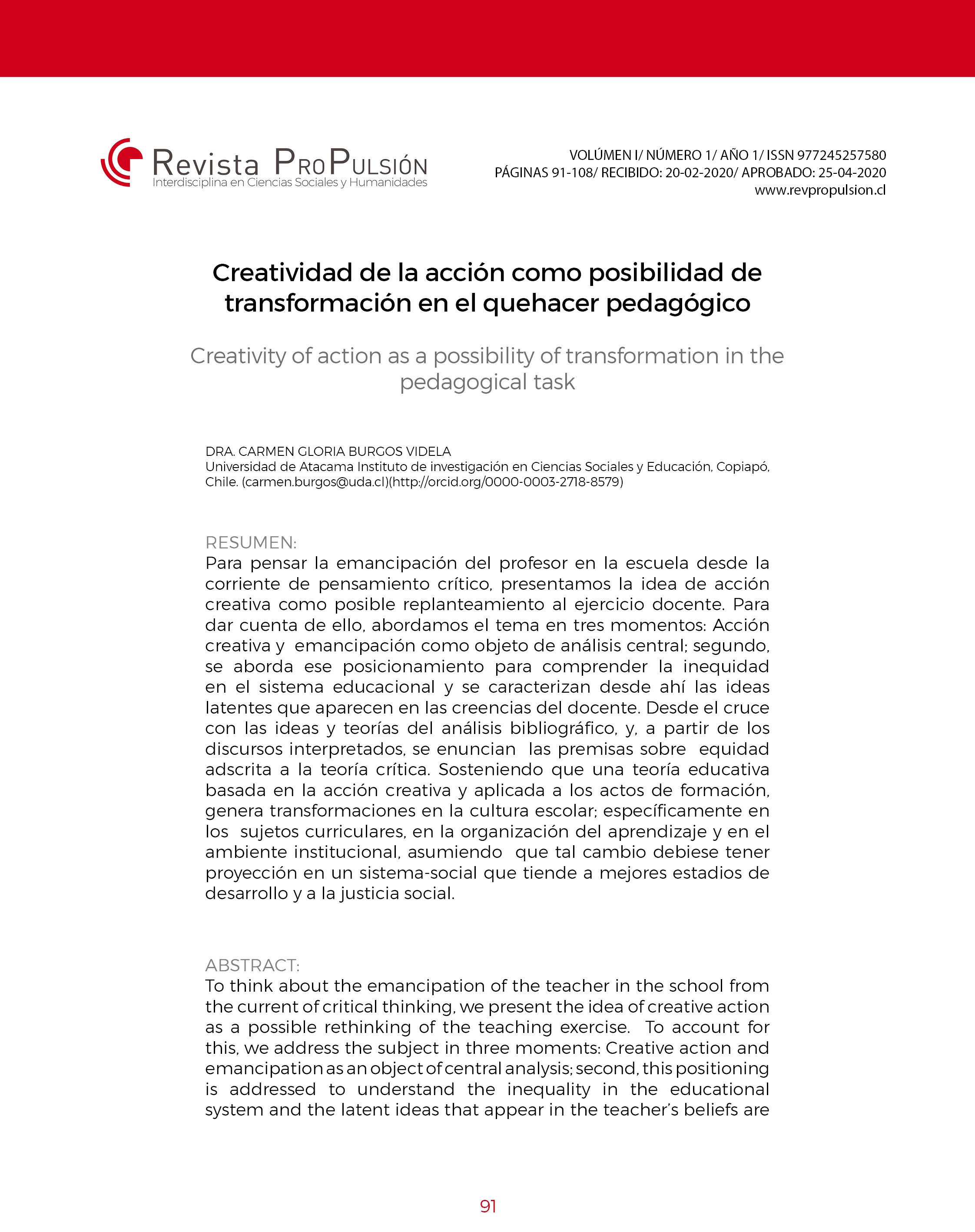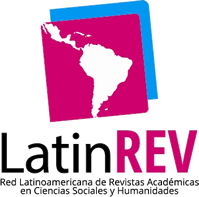Creativity of action as a possibility of transformation in the pedagogical task
DOI:
https://doi.org/10.53645/revprop.v1i1.85Keywords:
emancipation, creative action, work, pedagogical, equity, social justiceAbstract
To think about the emancipation of the teacher in the school from the current of critical thinking, we present the idea of creative action as a possible rethinking of the teaching exercise. To account for this, we address the subject in three moments: Creative action and emancipation as an object of central analysis; second, this positioning is addressed to understand the inequality in the educational system and the latent ideas that appear in the teacher’s belief are characterized from there From the intersection with the ideas and theories of bibliographic analysis, and, from the interpreted discourses, the premises on equity ascribed to critical theory are enunciated Maintaining that an educational theory based oncreative action and applied to the acts of formation, generates transformations in school culture; specifically in the curricular subjects, in the organization of learning and in the institutional environment, assuming that such a change should have projection in a social-system that tends to better stages of development and social justiceDownloads
References
Adorno, Teodoro. (1998). Educación para la Emancipación. Morata.S.L.
Apple, Michel, W. (1986). Ideología y currículo. Madrid.: Akal,S.A.
Giroux, Henry, A (1997), Los profesores como intelectuales. Hacia una pedagogía crítica del aprendizaje. Paidós-mec.
CEPAL/UNESCO. (1992), Conocimiento y educación, ejes de la transformación productiva con equidad. Informe Final, 4.
Cristiano, Javier, L (2012). La Creatividad como aspecto de un replanteamiento de la teoría sociológica de la acción. Cuadernos de filosofía latinoamericana. 33 (106) pp.53-62. en: Philpapers.org/rec/CRILCC. (Consulta: 24 de abril 2013)
Echeita, Gerardo, S. (2013). Inclusión y exclusión educativa. De nuevo " voz y quebranto". Revista Iberoamericana sobre Calidad, Eficacia y Cambio en Educación. 11 (2).
Educación 2020 (2018). Menos carga administrativa, más calidad educativa. Recuperado de http://educacion2020.cl/wp-content/uploads/2018/06/M%C3%A1s-calidad-menos-carga. pdf
Obtenido de http://www.rinace.net/reice/nuemros/arts/vol11num2/art5.pdf
Freire, Paulo. (1989). La educación como práctica de la libertad. Siglo XXI.
Freire, Paulo (1992). Pedagogía del oprimido. Siglo XXI.
García, C. (2017). Los desafíos de la educación ciudadana en Chile. Una aproximación comprensiva desde las significaciones pedagógicas de los profesores de historia. Enseñanza de las ciencias sociales, (16), 115-126. doi: 10.1344/ECCSS2017.16.10.
Grundy, S. (1991). Producto o Praxis del currículo. Morata S.L. Colección Pedagogía.
Joas Hans. (2005a). The creativity of Action. University of Chicago Press.
Magendzo, Abraham. (1991). Superando la racionalidad instrumental. PIIE.
Mitsgeld, D. (1993). Hacia un nuevo Humanismo, Modernidad, derechos humanos y Educación. PIIE.
OIE-UNESCO (2018). Estado, mercado y currículum escolar: la experiencia chilena (1964- 2018). Santiago: OEI-UNESCO. Recuperado de https://unesdoc.unesco.org/ark:/48223/ pf0000265296
Puiggrós, Adriana. (1990). Imaginación y crisis en la educación latinoamericana. Alianza editorial Mexicana CNCA.
Pinto Contreras, Rolando. (2008). El currículo crítico una pedagogía transformativa para la educación latinoamericana. Ediciones UC. Santamaría, José, Sánchez. (2014).
Tendencias internacionales sobre equidad educativa desde la perspectiva del cambio educativo. Revista electrónica de investigación Educativa. http://dialnet.unirioja.es/servlet/autor?codigo=2031743 ( consulta: 3 de Octubre 2014)
Unidad de Currículum y Evaluación. Ministerio de Educación / Programa de las Naciones Unidas para el Desarrollo / EDECSA (2018). Estudios de exploración de los procesos de implementación curricular en el sistema educacional chileno. Recuperado de https://www. curriculumnacional.cl/614/articles-70906_archivo_01.pdf
Vilas, C. (1999). Más allá del consenso de Washington. Revista Centro Americana de Administración Pública.

Published
Versions
- 2020-06-11 (2)
- 2020-06-11 (1)
How to Cite
Issue
Section
Categories
License
Copyright (c) 2020 Carmen Carmen Burgos

This work is licensed under a Creative Commons Attribution-NonCommercial 4.0 International License.
- Esta licencia permite a los reutilizadores distribuir, remezclar, adaptar y construir sobre el material en cualquier medio o formato solo con fines no comerciales, y solo mientras se dé atribución al creador.Incluye los siguientes elementos: POR – Se debe dar crédito al creador NC – Solo se permiten usos no comerciales de la obra.







